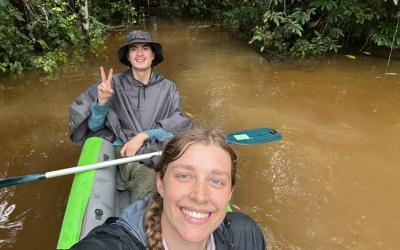20200225_SustainableGoals_ClimateAThe tropics, which occupy about seven percent of the Earth’s surface, contain the bulk of our biodiversity. Unfortunately, they are also the regions that are experiencing some of the highest rates of destruction. The destruction of tropical systems has many adverse consequences including drastic changes in regional and global climate patterns and loss of potentially important medicinal compounds and other useful products. There still exists an immense amount of knowledge to be gained from studying tropical ecosystems and a desperate need for more experts in the field of tropical biology.
The Tropical Ecology Program consists of two 4-credit courses that offer students the chance to gain firsthand experience in studying key tropical ecosystems. These ecosystems include lowland rainforests, montane cloud forests, and the high-elevation shrublands of the Andes mountains (known as páramo). The first course, worth 4 graded credits, involves students in developing and conducting a research project in Ecuador. They will create presentations to share their findings with their peers. As part of this course, students will also learn how to maintain a daily 'field journal' to record observations and reflections. Additionally, a series of preparatory meetings will introduce students to the topics and organisms they will encounter in the field. The second course, which is ungraded (Pass/No Pass), provides hands-on experience in all the aforementioned ecosystems. This includes identifying organisms, practicing field research methods, and attending lectures conducted by an international team of biologists and naturalist guides.



